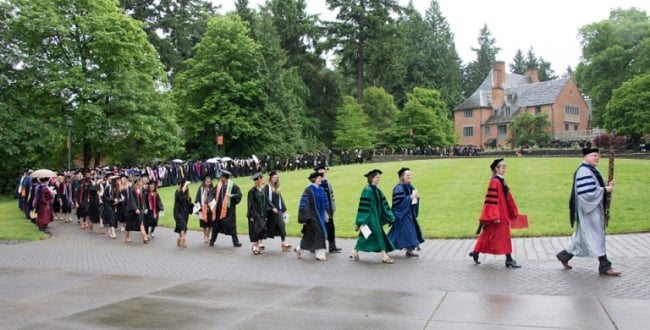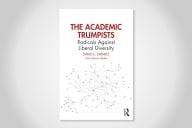You have /5 articles left.
Sign up for a free account or log in.

Lewis & Clark Law School commencement
Lbcstud562/Wikimedia
Student interest in legal education has ballooned in recent years, driven by the pandemic, the movement for racial justice and a hot job market, experts say.
“All the events that we’ve had—the pandemic, the Jan. 6 Capitol insurgence, the Black Lives Matter movement, the murder of George Floyd—everything has put a spotlight on why law matters,” said Kellye Testy, president and chief executive officer of the Law School Admission Council. “It’s galvanized in young people a desire to pursue justice and to find a way to contribute and to make a difference positively in the world. Law is always seen as a really good pathway for that.”
Flush with students, the U.S. legal education sector is undergoing some of its biggest changes in years. Law schools are amending their curricula to include more work experience and consideration for student well-being. LSAC, which administers the Law School Admission Test, is developing an undergraduate curriculum that could one day replace the test for some students. And a private university in Florida is planning to open its own law school—the first new one in eight years.
Law schools received especially high numbers of applications in 2021, and volumes remain above historic levels this year. As of early March, the number of law school applicants for the upcoming academic year was down 9.5 percent over last year, but it was still 8.3 percent higher than in 2020, according to data from LSAC.
Application numbers at Lewis & Clark Law School in Portland, Ore., follow this trend, according to Mimi Huang, assistant dean of admissions there.
“We had a huge increase during the fall 2021 cycle, which was the most recent incoming class cycle … We had almost a 30 percent increase in applications in one year,” Huang said. “This year we’re seeing a little bit of a shrinking of that increase.”
Emily Komie, a first-year law student at Lewis & Clark, took the LSAT when the pandemic began. She hopes to use her law degree to work on environmental justice.
“The prospect of going to law school was in the back of my mind when I was in college and studying environmental science and filmmaking,” Komie said. “When the pandemic hit, I had time off from work and decided that was a good time to take the LSAT.”
Nationally, this year’s first-year law class is the most diverse ever, Testy said. More students of color are taking the LSAT, and those who do tend to earn higher scores—perhaps in part because the admission council has focused on making free test prep available for all students. The council has partnered with Khan Academy to offer LSAT preparatory courses at no cost and also offers free prep through Law Hub, its own online product.
Law schools have received 15.8 percent more applicants from Black and African American students for the upcoming academic year than they did in 2020. The number of Hispanic and Latino applicants has also increased, by 16.2 percent over 2020.
In an effort to further expand access to legal education, LSAC announced Wednesday it is working on a pilot program to create a prelaw curriculum for undergraduates that would effectively replace the LSAT for some students. The courses, to be introduced on selected campuses, would teach students the skills they would typically demonstrate on the LSAT, according to Kaitlynn Griffith, vice president for product development and business intelligence at LSAC.
“It’s really important to us that law students can come from any undergraduate major; we don’t want them to have to focus on a specific area of study,” Griffith said. “The goal is to design the coursework and measurement tools to be complementary to the undergraduate work that the students are doing and not an additional burden for them.”
Cornell College, Northeastern University and the University of Maryland Eastern Shore will pilot the Legal Education Program, which will initially include two courses. Jonathan Brand, president of Cornell, is especially excited about the academic and social support that the curriculum will provide to prelaw students.
“Law school can be very challenging—it’s like learning a whole new language. Preparing students more formally while they’re undergraduates for law school will really help them succeed in law school more quickly,” Brand said.
Given all the stressors, many law schools have begun taking student wellness more seriously in recent years, Testy noted.
“Legal education is a high-pressure education, and so schools have, over time, gotten better at keeping the rigor of the academics but pairing it with a real appreciation for student needs and student development,” Testy said.
The quality of law education is also improving, Testy said. More institutions have begun pairing legal education with work experience—such as in legal clinics—allowing students to practice what they’re learning in class while assisting people who need legal help. Matt Heldt, a second-year law student at Lewis & Clark, participated in a clinic for small businesses this past fall, providing business owners with legal services at no cost.
“I had two clients that were local businesses, and that was a really rewarding experience,” Heldt said. “I was able to—with a mask on—physically go into the clinic and be with my peers and my supervisor who worked there.”
In addition to recent social and political events, a strong job market is driving students to pursue law. A recent report from the Foundation for Research on Equal Opportunity showed that of all advanced degrees, those in law and medicine offered the most lucrative returns. More than nine in 10 law programs offer graduates positive median returns, and a quarter yield a return on investment of more than $1 million.
“Law firms and companies that have big internal legal departments—they can’t find enough lawyers right now,” Testy said.
Jacksonville Gets a Law School
Jacksonville University in Florida plans to open up a new law school while demand is high. The university will welcome its first class next fall, aiming to enroll about 30 students, according to Margaret Dee, senior vice president for economic development and external engagement at Jacksonville. The university was chartered to teach law when it was founded by a judge in 1930 but “never got around to that” until now, Dee joked.
The city’s legal establishment welcomes the addition.
“We found that not only did the market want us here in Jacksonville, the legal profession has been incredibly receptive,” Dee said. “As one of the largest cities in the country that didn’t have a law school, we were really missing an important element of what I would call the legal ecosystem that cities rely upon to serve the community.”
As of last week, the new law school had received 126 applications for the few dozen openings. Eventually, it plans to enroll up to 400 students.
“We will always ultimately be on the smaller side of law schools,” Dee said. “We would be looking for class sizes of 100 to 125.”
Jacksonville University’s new law school is the first to open in the U.S. in nearly a decade. After the Great Recession of 2008, the legal education market shrank, and several law schools shut their doors due to declining enrollment. Concordia University School of Law in Boise, Idaho, closed in June 2020. Valparaiso Law School shuttered in 2018. Whittier Law School and Indiana Tech Law School both closed in 2017.
“After the Great Recession, there was a correction in terms of the volume of people applying and being admitted to law school, and so there was a downward trend” in enrollment, Testy said.
Dee and other university officials spoke with leaders at some of the law schools that shut down before deciding to open the new law school.
“You have to have a revenue plan that doesn’t so heavily rely on your tuition revenue to sustain itself—you have to be the right size,” Dee said. “And you have to aim for high quality and high outcomes.”








